#and then a morepork starts crying out through the silence and it's like
Text
i fucking love moreporks man i’ve said it before and i’ll say it twenty more times what funky little calls you have i adore you
#also it's like#night is generally the time when i'm going through it the most#really struggling#feeling it all#and then a morepork starts crying out through the silence and it's like#yes ur a weird funky owl demanding more pork but ur also a sign of company on this quiet night#a sign of life out there in the dark#it's oddly comforting for some reason#can't really drown in the night if one lil dude demands to break it with his calls and reach out#anyway i'ma go brush my teeth and go to bed before the depression kicks in too much#but i appreciate moreporks okay#i will grab onto whatever i can find to keep pushing forward#and if that's a morepork then so be it#ain't about to judge myself for something i find odd comfort in
3 notes
·
View notes
Text
The Enigma of Wilderland
20 minutes south of Whitianga lies an anarchist community called Wilderland. Pine trees stud the gravel road, which is not council maintained and winds for two kilometres past several other farms. Pine tree roots have a symbiotic relationship with fly agaric mushrooms (Amanita muscaria), and as I walk up the road one winter night shortly after lockdown it is almost as if the toadstools are guiding the way. As strange as it sounds, it feels as though I am following some sort of Hansel and Gretel crumbs into fairyland.
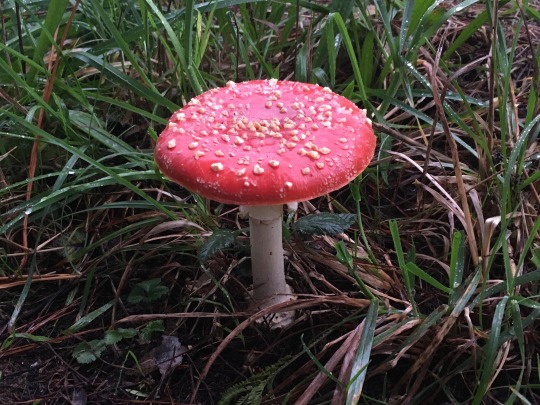
[Caption: Amanita muscaria at Wilderland]
Every so often a handpainted sign reads “WiLDERLAND,” with an arrow pointing the way. A lot of people get lost finding it for the first time, and I am no exception. I am walking the road because I had taken a wrong turn and got my 1992 Toyota Starlet hatchback stuck in a farmer’s muddy field during a rainstorm.
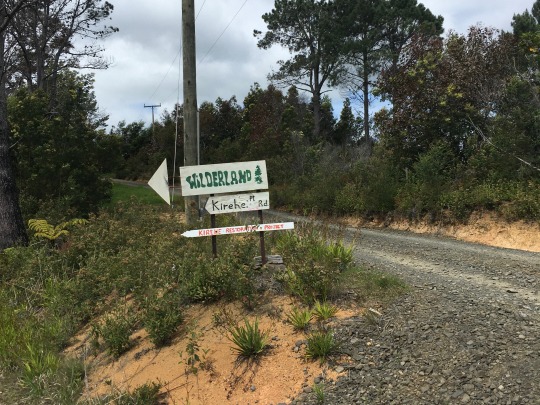
[Caption: The long and winding road]
Wilderland is an example of a self-sufficient community, of which there are many in Aotearoa. The difference is, while most such communities are closed, anyone can go to Wilderland. All you have to do is apply on their website and commit to a full month of work (unpaid, of course). New intakes arrive every second Sunday. With the exception of a handful of long-term residents, the 20-30 people living at Wilderland at any given time are always changing. If you are serious about learning how to be self-sufficient, or just curious to see if it is really possible, you can go to Wilderland and see how it’s done.
In 1956, the land on the property that became Wilderland was abandoned by its owner. A long-term resident called Ken, who is in his 60s, tells me that the reason was that the land was too difficult to farm. The original farmhouse still stands on the property, although it has been condemned by the council. Ken tells me that a family of six used to live there before it was abandoned 65 years ago. Today, the house is thoroughly overgrown with jasmine and stands in the middle of a forest. One needs a machete to cut through the jasmine into the house, and inside there are only two items: a 30-year-old newspaper and a picture book, Grandma McGarvey Goes to the Zoo.
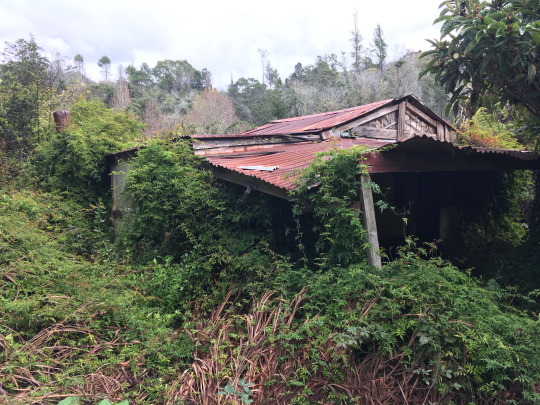
[Caption: The original farmhouse]
In October, 1964, Dan and Edith Hansen purchased the disused block of land (roughly 170 acres) on the Whitianga Estuary and founded Wilderland. At the time, it was one of Aotearoa’s only organic farms. Before he died, Dan Hansen donated the land to the Wilderland Trust, meaning no actual person owns the land. The Wilderland Trust is a registered charity in Aotearoa and the farm holds the Organic Certification. There is a lot of accountability that goes along with all of that which is taken quite seriously. For example, drugs and alcohol are not allowed.
The farm is collectively managed by trustees and the long-term residents, each of whom have voting rights. Anarchism as a philosophy is generally misunderstood: far from lawlessness, it is actually a highly organised system where power is decentralised and given to the community to make their own decisions on anything that affects them directly. At Wilderland, there are multiple meetings every week, discussions ranging from who should be allowed to stay, how money should be spent, what produce (if any) should be sold, what projects should be prioritised, whether the cat should have a bell on his collar to prevent native bird casualties, and so on. Everything is voted on. There is always work to do and everyone has their own pet projects. Conflict is natural, but it is reduced compared to a typical eco-village, because no one actually has their own financial resources tied up in the community.
In January, 2017, a fire destroyed about 25 acres of forest and four houses that were on the property. “We've managed to save more homes than we lost, but I feel very sorry for everyone from that community... there's not much left,” a rural firefighter was quoted as saying at the time. In the aftermath, 4000 new trees were planted to begin the recovery process but many long-term residents left. Wilderland has faced many challenges in its long history, and it is something of a miracle that it still exists when most of the other 1960s communes failed. One can read about the history of Wilderland in detail in one of the many postgraduate theses that have been written about it, or on their website, so I will focus mainly on my experience. The fire is worth mentioning, though.
On my first day, I am inducted with the rest of the newbies. The visitor host, Khan (named after Genghis), shows us around. We are shown the various gardens, the orchards, the buildings, the compost toilets. The tour ends with us planting some spring onions outside the main hall. The community hall is a rustic, rectangular structure containing a kitchen (vegetarian only), extensive library, musical instruments, personal lockers, couches, tables, and art supplies. Food is cooked using a wood burner oven, which also heats the hot water for the shower. The fire is lit at 7 am and usually burns until past 9 pm. Herbs are hung upside down next to the fire to dry, destined to be brewed in tea or sold at the roadside stall on State Highway 25.
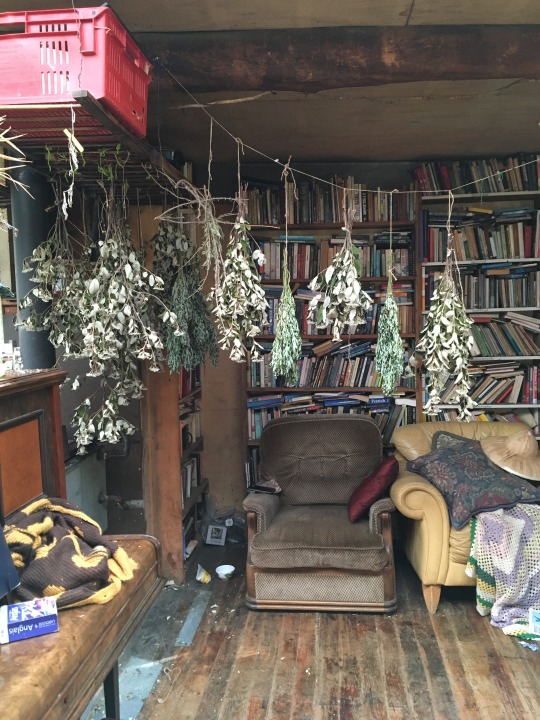
[Caption: Herbs drying in the community hall]
My accomodation is a metal shed which contains a bunk bed (long-term residents live in the houses, visitors sleep in cabins or tents or vehicles). I share the shed with a 22-year-old Australian man named Bryce. Over the month we live together, we become good friends. The shed is crawling with cockroaches and it becomes part of our nightly ritual to evict as many of them as possible using a jar. As soon as they are thrown outside they start coming back in through cracks in the walls. Cockroaches like to crawl on you during the night, and I regularly wake up in the night and turn on my torch to find myself surrounded. At times like these I simply read until the sun comes up and I can get out of bed. By week four, the sleep deprivation is really getting to me.
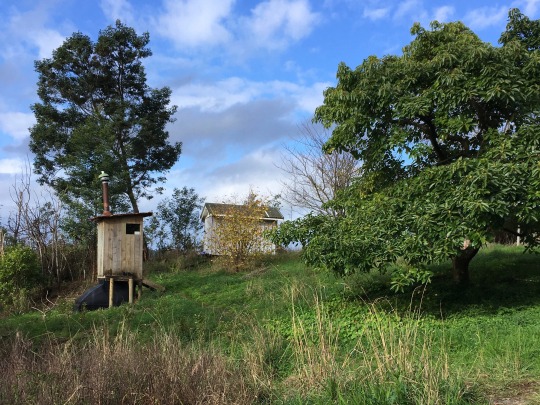
[Caption: A compost toilet and a cabin for sleeping (left to right)]
Every weekday morning at 8 am we meet in the community hall for porridge and the morning meeting. The main purpose of the morning meeting is to decide who will do what jobs that day. The work is varied and interesting, involving much more than just gardening: there is building and maintenance work, roads to be fixed, community lunch to be cooked (using food foraged from the gardens), a roadside stall to be manned, administration to be done, firewood to be chopped. Planting and harvesting is planned based on the phases of the moon and the solstices and such. At 1.30 pm every day, a massive bell outside the hall is rung by whoever made lunch that day and everyone finishes their work and eats together.
My first experience of the “lunch circle” is a bit of a culture shock. Everyone forms a circle and holds hands. Thankfulness is expressed.
“Thank you for helping me today in the Dolphin Beds,” says one hippie to his helper that day.
“Thanks for brushing your teeth,” says another to his girlfriend who stands slightly outside of the circle, brushing her teeth.
Then announcements are made, and finally, when everyone simultaneously senses the moment is right, hands are lifted with a universal cry of “WOOOOO!” Then lunch is served. After what is sometimes up to five minutes of someone sweating into my hands, I always have to scurry off to wash my hands before lunch, so I am always last in line.
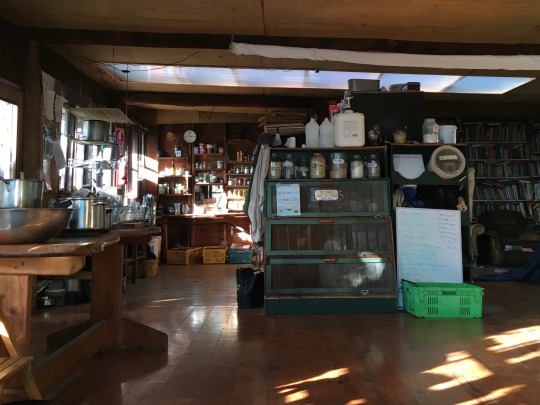
[Caption: The kitchen and the table where food is served]
The food is always incredibly good. Eating a diet of mainly fresh and seasonal produce is highly beneficial for physical health, and it gets me thinking about food — its effects on the mind, body, and spirit. Food is one of the most important needs of the human animal, after water but before shelter and fire. After a few weeks of eating food grown on the land I am living on, I begin to understand something J.R.R. Tolkein once allegedly said, according to C.S. Lewis:
❝ Tolkien once remarked to me that the feeling about home must have been quite different in the days when the family had fed on the produce of the same few miles of country for six generations, and that perhaps this was why they saw nymphs in the fountains and dryads in the wood — they were not mistaken for there was in a sense a real, not metaphorical connection between them and the countryside. What had been earth and air and later corn, and later still bread, really was in them. We of course who live on a standardised international diet — you may have had Canadian flour, English meat, Scotch oatmeal, African oranges, and Australian wine today — are really artificial beings and have no connection, save in sentiment, with any place on earth. We are synthetic men, uprooted. The strength of the hills is not ours. ❞
Time passes differently at Wilderland. It takes me about two weeks to adjust to the rhythm and the silence. In the afternoons after work I bathe in the rock pools or kayak in the estuary or try to learn a dusty accordian in the hall or do any number of other wholesome activities. Poetry club happens on Wednesdays. Every second Thursday is pizza night (cooked in the outdoor woodfire pizza oven). Every Friday night is Meat Club — a group of meat enthusiasts pitch in for some sausages and steaks from the Whitianga butcher and cook it outside on a fire far away from the hall, paired with lots of cheap red wine (another contraband). On the weekends everyone does their own thing — I spend mine exploring.
It is worth mentioning the stars. Being treated to blazing constellations every night with no sound but the morepork feels like a massive privilege. But it shouldn’t be. For thousands of years, humans looked to the stars to find meaning and our general lack of ability to do that nowadays is one reason why we are so spiritually impoverished. Bright stars are an innate human need and light pollution has taken that away from us.
As a layperson, my understanding of permaculture increases slowly. One day, I am working with Khan and he says something that connects a lot of dots for me. “Permaculture gardens are like tiny forests. There are tall things and short things and things that exist mainly underground. There is a throbbing animal and insect life and there is mycelium, a brain that connects everything like the internet. There is biodiversity. There are bees. And everything works together in the same way as a forest.”
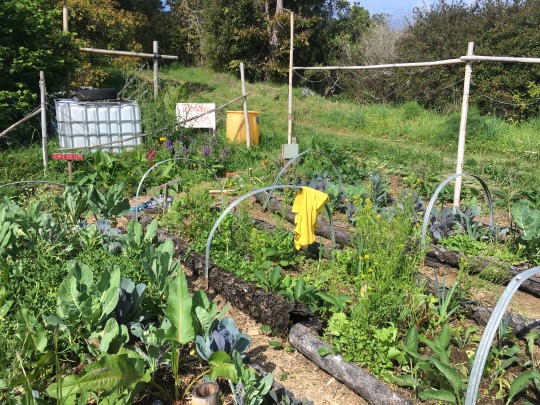
[Caption: The Dolphin Beds — apparently a dolphin was buried here once]
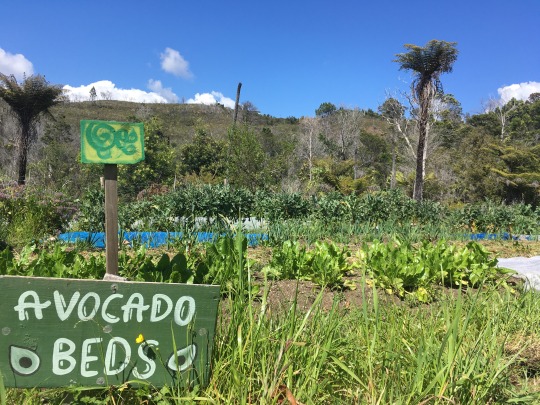
[Caption: Hina Hina, where a famous battle took place in the 1860s]
On my first Friday morning, I have another culture shock. One of the strange traditions in this place is to have a “Dialogue” every Friday morning from 9 am until 10 am before work. In theory the Dialogue is an open platform where anything can be discussed, in reality though the main topics that get discussed at the Dialogue are “What is the Dialogue?” and “Why don’t we replace the Dialogue with x?” No one really knows what it is for. Newbies are thrown in the deep end and long-term residents regard it as sacred and any attempt to abolish or replace it as subterfuge. Emotions run high. People storming out is common, crying is common, and cigarettes are smoked afterwards.
[Footnote: Like any isolated community, Wilderland has its own unique politics. I adopted the renegade view of “Dialogue Abolitionist.” I suggested that a much healthier way of purging the tension of the group would be to have a fight club, but this was not well-received.]
It is my last day. Apparently I can’t just leave. Everyone gives me a hug; I am the recipient of several group hugs. A jar of local honey is pressed into my hands, entreaties are made for me to return. I realise that like the plants I helped to cultivate, I have roots here now.
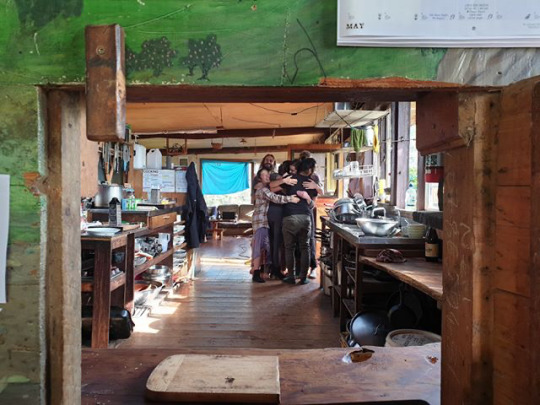
[Caption: Saying goodbye]
What is Wilderland? Is it a hippie commune? An eco-village? A cult? It is none of those things, really. I see it as more of an educational community. It models self-sufficiency, although it is partially reliant on the outside world. It models anarchism on a micro level. It teaches the patience of permaculture to a world drowning in Roundup. Most of it all, it clearly demonstrates what is possible. It is no secret that dairy farms are causing Aotearoa excessive droughts. Importing and exporting and transporting food exacerbates the climate crisis and makes us reliant on the global economy (which as Covid has shown, is frighteningly fragile). Wilderland proves that things could be better. For 56 years, Wilderland has represented a choice — the possibility of a better world where nature is worshipped and humans have freedom.
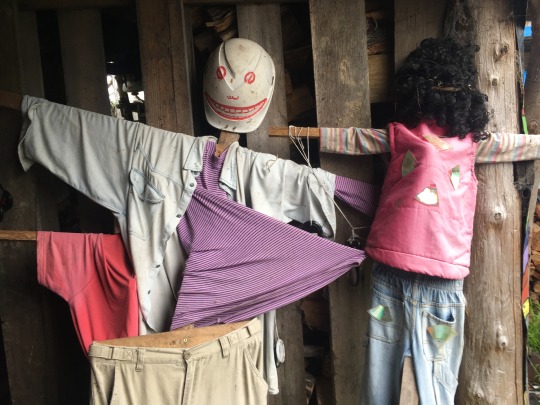
[Caption: Scarecrows]
1 note
·
View note